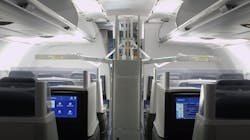JetBlue to test Honeywell UV cleaning system in its aircraft interiors
Honeywell (Phoenix, AZ)'s UV Cabin System has been put in service as part of a pilot by JetBlue Airways (New York, NY), reportedly marking the first time a U.S. airline has implemented the Honeywell technology. In clinical studies, UV light has been found to be capable of significantly reducing certain viruses (including the virus that causes COVID-19) and bacteria when properly applied at prescribed levels. The Honeywell UV Cabin System can traverse an aircraft cabin in less than 10 minutes, and JetBlue will be gauging the system's place in its operation, while continuing other cleaning methods.
Honeywell has delivered eight of the devices to JetBlue, and the devices are now being put into service as part of JetBlue's Safety from the Ground Up program at two of the airline's focus cities, John F. Kennedy International Airport (New York, NY) and Fort Lauderdale-Hollywood International Airport (Fort Lauderdale, FL). These two locations kicked off a 90-day pilot program for JetBlue to evaluate the Honeywell solution.
The Honeywell UV Cabin System is roughly the size of an aircraft beverage cart and has UV-C light arms that extend over the top of seats and sweep the cabin to treat aircraft surfaces. Properly applied, UV-C lights can deliver doses that clinical studies have found to be capable of reducing various viruses and bacteria, including SARS-CoV and MERS-CoV. Results vary based on UV dosage and application.*
For SARS-CoV-2, the virus that causes COVID-19, there are multiple medical studies underway involving UV-C light. Preliminary results from studies performed by Boston University and a consortium of Italian medical and academic professionals report that UVC light can inactivate the virus at prescribed dosages in the lab. Additional studies are underway for other environments.*
*Clinical studies compiled by Honeywell, not verified by JetBlue Airways.
For more information, please visit honeywell.com.
Source: Honeywell press release via PRNewswire – July 29, 2020
